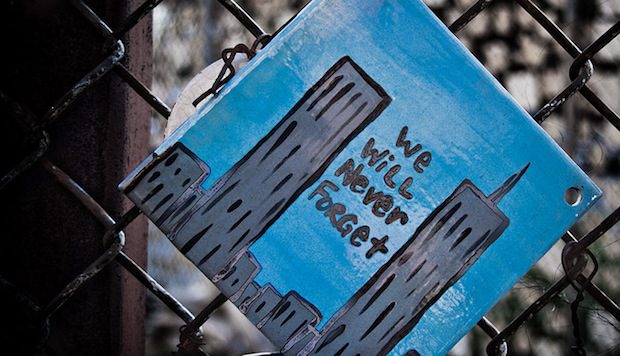9/11 And The Burden Of History

Today is September 11. It feels a lot like September 10. I imagine I will experience September 12 in the same way.
“Did you ever think you would wake up and 9/11 would feel normal?” I asked my wife.
“No,” she said. “Thank God for that.”
I agree: thank God for that. We were New Yorkers on 9/11. Because I was a newspaper reporter, and because the last words I said to my wife before running across the Brooklyn Bridge to the burning towers was, “I’m going to get as close as I can,” and because she could not reach me by mobile phone after the first tower collapsed, so she thought I was dead, and because like every other New Yorker we lived through that horrible autumn of smoke and stench and funerals, and missing posters on every public surface, and PTSD, and anger, constant anger, and fear, and conversations about whether or not it would be worth living if a dirty bomb went off in Manhattan — because of all these things, it is a blessing that 9/11 feels like just another day now. I never thought it would.
My next thought is guilt. Am I forgetting them? I am forgetting them. For a long time, years after that day, I believed that I was obliged to maintain the traumatic bond with that day, as a matter of honor. Never forget. But you can’t live like that. You can exist like that, but you can’t live like that. There is the old woman I know, long divorced, who cannot let go of her bad marriage. She has built an entire identity around the memory of her abusive ex-husband, and her own victimization. It has ruined her. As far as I can tell, the man was horrible to her. But this was 30, 40 years ago. She’s as angry as if it were yesterday, and if you naively pity her and try to ease her pain, she will turn on you as uncaring and disloyal. Her bad marriage, with all its hate and pain, is the event that gives her life meaning. I didn’t know her before the divorce, but I imagine that she was a beautiful, caring woman. Now, the memory of her suffering has disfigured her.
When I am tempted to judge that woman, I think about myself, and how impossible it was for me to imagine a day like today: a 9/11 when everything felt normal. How there was a time when I would have seen someone like myself today, detached from the emotions of that day, as decadent and uncaring. You have forgotten them. It is still not possible to feel unguilty about that, but give it time.
It will never feel normal for those who lost friends and family in the attacks on the Trade Center and the Pentagon, or on the plane that crashed in Shanksville. But maybe things are more normal for them today than they were. I hope so. I’m thinking right now of Rebecca West’s 1930s Balkans travelogue Black Lamb And Grey Falcon, and about how in that book, she recalls in great detail conversations with intelligent and passionate Serbs, Croats, and Bosniaks, all of whom have intense historical memories of the great and terrible wrongs their people suffered at the hands of the others, and all of whom were right, more of less. But they were all slaves of history. Their people’s history was a rock to which they were all chained. I usually lament our lack of historical consciousness in this country, but reading that book was the first time I understood that a people could be poisoned by too much history. It was the first time I can recall feeling gratitude for American forgetfulness.
Does the passage of time and the purification of memory help us to see things more clearly, or does it cause us to lose clarity?
Can we forget without forgetting? Can we forget without shaming ourselves by our disloyalty to the dead? How? Maybe those are questions only a Southerner would ask.
Christianity’s genius: commanding forgetfulness, the canceling of the moral debt, and making doing so a virtue.
May God bless the memories of everyone who died on this day in 2001, and may He bless those who mourn.
Subscribe for as little as $5/mo to start commenting on Rod’s blog.